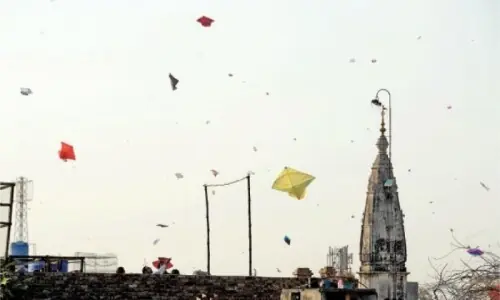ISLAMABAD: Former president retired Gen Pervez Musharraf will lose his legal right to defend his case if he fails to appear on May 2 before a special court seized with a treason trial against him for clamping the state of emergency on Nov 3, 2007.
The decree was issued by the Supreme Court on Monday to help the special court reach a logical end with a clear directive for the latter to go ahead with the treason case against Mr Musharraf on May 2 without recording his statement under Section 342 of the Code of Criminal Procedure (CrPC) in case he did not show up before the trial court.
“If the accused avails defence under Section 342, then he should appear before the special court, otherwise he will lose the right of defence,” said an order dictated by Chief Justice Asif Saeed Khosa at the end of Monday’s hearing.
A three-judge SC bench headed by the chief justice had taken up a petition of former president of the Lahore High Court Bar Association Taufiq Asif. The petition sought intervention of the apex court in the treason trial being heard by the special court, pointing out that the proceedings of the case against Mr Musharraf had come to a halt.
Ex-president will lose legal right to defence if he fails to appear before trial court on May 2
The special court after hearing arguments of the prosecution would decide the matter, but if he [Mr Musharraf] appeared before the trial court on May 2, he would have all the normal rights of defence, the court order said, adding that the Supreme Court would keep the matter pending and fix it again after the hearing by the trial court on May 2.
Mr Musharraf went to the United Arab Emirates for treatment of his spinal injury in March 2016 and since then he has been living abroad.
On Monday, senior counsel Hamid Khan, Taufeeq Asif and Sheikh Ehsanuddin argued before the court against Mr Musharraf and pointed out that section 9 of the special court rules empowered the trial court to go ahead with the case if the accused was absent on purpose.
Prosecutor Naseeruddin Nayyar read out the March 28 order of the trial court and argued that Mr Musharraf had been indicted when the charge sheet was framed in his presence, though he denied all the charges. When the former president went abroad, the entire statements of prosecution witnesses were recorded and cross-examined in the absence of the accused after both the defence and prosecution concurred to his absence, the prosecutor said.
At the last hearing on March 25, the Supreme Court had made it clear that it would intervene in case the special court did not decide in clear terms about the fate of the trial. Consequently, the special court had summoned Mr Musharraf for May 2 by ignoring a request of his counsel Salman Safdar to postpone the hearing till May 13 because his client, who was undergoing treatment for his ailment, intended to return to the country.
On Monday, the Supreme Court observed that the special court had kept its last order open-ended in which it had not mentioned what would transpire in case Mr Musharraf failed to come back. The apex court deplored that the federal government had not challenged the special court order and the trial court itself closed other options and got itself into a blind alley.
The SC bench went into a break to ponder over the July 19, 2016 decision of the trial court in which it was held that the case of Mr Musharraf, who had been declared a proclaimed offender by it, could only be commenced when he returned.
The counsel for Mr Musharraf informed the apex court that his client had expressed his desire to come back to Pakistan but he was undergoing chemotherapy from two different hospitals right from early morning till late evening. And in the absence of Mr Musharraf the trial against him could not commence, he argued but avoided giving assurance in clear terms.
The Supreme Court observed that in case Mr Musharraf did not come on May 2, the trial court should proceed with and decide the matter on the basis of the arguments of the prosecution.
The chief justice asked what would happen when despite assurances Mr Musharraf did not come, adding that something had to be done if he did not return as the courts could not sit helpless in his absence. He observed that the trial became unconstitutional in the absence of a suspect, but if the suspect did not appear on purpose, he could not be allowed to take advantage of the situation.
The court observed that the high treason was not an average crime.
Published in Dawn, April 2nd, 2019

































